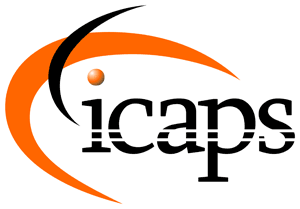 Welcome Welcome
|
 Important Dates Important Dates
|
|
New! Registration
|
 Program Program
|
 Call for papers Call for papers
|
 Accepted papers Accepted papers
|
 Workshops Workshops
|
 Tutorials Tutorials
|
 System Demonstrations System Demonstrations
|
 International Planning Competition International Planning Competition
|
 Doctoral Consortium Doctoral Consortium
|
 Summer School Summer School
|
 Venue Venue
|
 Colocated Events Colocated Events
|
 Organization Organization
|
 ICAPS ICAPS
|
 Sponsors Sponsors
|

|
|
Click image to download Poster (size: A1)
|
|
|
Doctoral Consortium
Accepted Doctoral Consortium papers
-
Jorge Baier and Sheila McIlraith (University of Toronto),
Planning with temporally extended
goals using heuristic search
-
Gregory Beaumet,
Continuous planning for the control of an autonomous
agile satellite
-
J. Benton,
Solving goal utility dependencies and simple preferences in
partial satisfaction planning
-
Daniel Bryce,
Sequential Monte Carlo in probabilistic planning
reachability heuristics
-
Blazej Bulka,
Analyzing, learning, and shaping planning search spaces
-
Lukas Chrpa,
Linear logic in planning
-
Andrew Coles,
Generic types and their use in improving the quality of
search heuristics
-
Rocio Duran,
Integrating macro-operators and control-rules learning
-
Janae Foss,
Techniques for generating optimal, robust plans in the
presence of temporal uncertainty
-
Matthieu Gallien,
Controlability and Makespan issues with robot action
planning and execution
-
Peter Gregory, Derek Long, and Maria Fox,
Backdoors in planning and
scheduling problems
-
Natalia Gardiol and Leslie Pack Kaelbling,
Computing action
equivalences for planning
-
Sarah Hickmott,
Concurrent planning using Petri Net unfoldings
-
Branislav Kveton and Milos Hauskrecht,
On the smoothness of linear
value function approximations
-
Peter Lamborn and Eric Hansen,
Memory-efficient graph search in
planning and model checking
-
Stephen Lee-Urban and Hector Munoz-Avila,
A study of process
languages for planning tasks
-
M. Gourgand, N. Grangeon, D. Lemoine, and S. Norre,
Software tool for
the master production schedule conception based on the Capacitated Lot
Sizing Problem
-
Iain Little,
Towards efficient probabilistic temporal planning
-
Mausam and Daniel Weld,
Challenges for temporal planning with
uncertain durations
-
Michael Moffitt,
Efficient and expressive extensions of
constraint-based temporal reasoning
-
Evdokia Nikolova,
Path planning under uncertainty: Complexity and
algorithms
-
Hector Palacios and Hector Geffner,
Easy and hard conformant planning
-
David Pardoe,
Predictive planning for supply chain management:
Adapting to competitor behavior
-
Riccardo Rasconi,
Integration of constraint-based off-line and on-line
approaches to project scheduling
-
Palao Reines,
Improving planning techniques for web services
-
Mark Roberts,
Exploiting portfolio strategy to explore the interaction
of problems and algorithms in AI planning
-
Mark Rogers,
Infeasible search analysis for oversubscribed scheduling
problems
-
Scott Sanner,
First-order decision-theoretic planning
-
Olga Skvortsova,
Say "no" to grounding: An inference algorithm for
first-order MDPs
-
Amanda Smith,
Extending the use of plateau-escaping macro-actions in
planning
-
Matthew Streeter and Stephen Smith,
Selecting among heuristics by
solving thresholded k-armed bandit problems
-
James Thomas,
Collaborative authoring of plan-based interactive
narrative
-
Menkes van den Briel,
Planning with preferences and trajectory
constraints by integer programming
-
Christine Wu, Kenneth Brown, and J. Beck,
Scheduling with uncertain
durations: Generating beta-robust schedules using constraint
programming
-
SungWook Yoon,
Discrepancy search with reactive policies for planning
-
Alessandro Zanarini,
Planning with soft regular constraints
Call for Doctoral Consortium
The International Conference on Automated Planning and Scheduling (ICAPS'06) invites PhD students to apply for the Doctoral Consortium.
The aims of the Doctoral Consortium are:
- to provide a forum for students to present their current research and receive feedback from other students and senior researchers;
- to facilitate networking among Ph.D. students and senior researchers working in the same area;
- to support students with information on academic, research and industrial careers.
The Doctoral Consortium is a graduate student mentoring program that will introduce students to senior
researchers with similar interests. To give the Doctoral Consortium participants an opportunity to
meet each other, a lunchtime panel on effective research strategies will be held on the first day
of the conference (June 8). A poster session for the Doctoral Consortium will be held that evening,
in conjunction with software demonstrations and a poster session for the main conference.
Each student will be matched to a senior researcher and will meet their mentor in a relatively informal
setting (lunch). Students accepted in the Doctoral Program will receive a scholarship that covers conference
registration and part of their travel expenses.
We encourage submissions from Ph.D. students at any stage and from any topic area within Planning and
Scheduling. Preference will be given to students who are far enough along to have formulated their dissertation
topic. Applicants should submit an extended abstract of three (3) pages maximum by email to the Doctoral
Consortium chair. The submission should be in AAAI style format and sent either as a PostScript or as a
PDF file. It should describe original, unpublished work, completed or in progress, that is part of the
doctoral work of the student. If an extended version of the paper is also submitted to the technical
consortium, please indicate this in the submission. In addition, the dissertation advisor should send a
letter of recommendation by e-mail to the Doctoral Consortium chair. It should indicate when
the student is expected to complete his/her dissertation and explain how the student would benefit
from participation in the Doctoral Consortium.
Upcoming Deadlines
|
Submission deadline (extended) |
Notification date |
Doctoral Consortium panel and poster session |
| Doctoral consortium |
20th March 2006 |
31st March 2006 |
8th June 2006 |
Doctoral Consortium Chairs
-
Jeremy Frank, NASA Ames Research Center, USA.
-
Marie desJardins, UMBC, USA.
|

